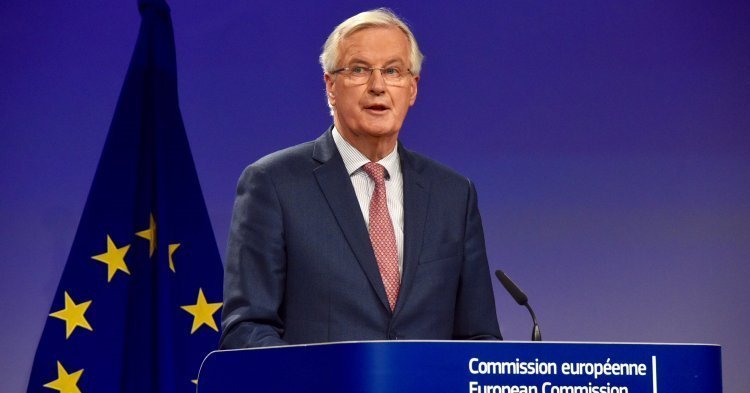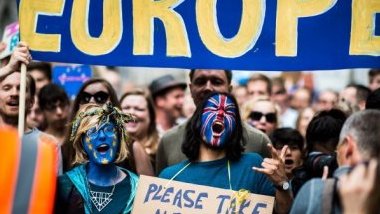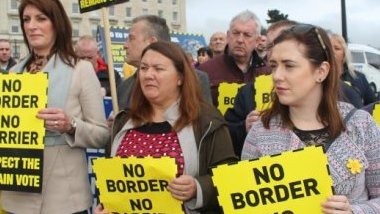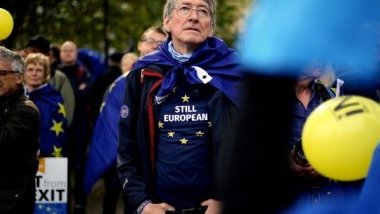"The negotiations are extraordinarily complex”
EU Chief Negotiator for the UK Exiting the EU since 1st October 2016, the former European commissioner meticulously follows Brexit preparations. This is an unprecedented situation in the history of European construction: a Member State which participated to European integration during 44 years exits the European Union, following the referendum of 23 June 2016 where 51,2% of British citizens decided to leave the EU.
In the framework set by the article 50 of the Treaty on the European Union, the British Prime Minister Theresa May launched the negotiation process on 29 March 2017, for a period which will have to last no more than two years. Facing David Davis on the British side, Michel Barnier and his team of 60 colleagues have to think up a Brexit which was still unthinkable in 2016, and above all unprecedented. “Negotiations have to be conducted in a practical, pragmatic and unique way, and I will ensure that they will remain unique”, he stressed.
Moreover, the support and unity of the 27 other EU Member States is essential. With the reiterated mandate of the European Council and the permanent cooperation with the European Parliament, Michel Barnier wants to “put in order the withdrawal” of the United Kingdom.
In addition to the extreme complexity of the negotiations with the UK, he must favour a European answer to this divorce, especially in “all subjects where Brexit can create uncertainties, concerns or fears”. As evidenced by his timetable, Michel Barnier meets with Member States’ governments, civil society, trade unions and political parties on a weekly basis in order to “understand” and draw inspiration in the negotiations. Coming back from Denmark, he made a brief stopover in Paris on 4th April, before leaving for the Czech Republic the week after.
Though he deeply regrets the decision of the British people, he wishes to negotiate “with no ulterior motive” or “spirit of revenge”, which he considers counterproductive. He also believes that “there cannot be any added value to Brexit, it cannot be a win-win situation. Breaking up weakens everyone, we thus have to try to limit the consequences”.
“The citizens are our priority”
Following last December’s prior agreement, the negotiations on the withdrawal process of the UK crossed a decisive step, especially concerning the three fundamental topics: the fate of the European citizens, the budget, and the question of Irish unity. With 3,5 million European citizens living or working in the UK, and 1,5 million British citizens living in the EU, securing the rights recognised in the EU must be guaranteed until the end of the transition period on 31 December 2020.
Established on multiannual frameworks of seven years, the construction of the EU budget complexifies the negotiations. For the 2014-2020 budget’s framework, the UK made commitments they have to respect. As Barnier warned: “Everything that was decided at 28 must be paid at 28. As in any separation, the accounts must be settled. The UK must respect its commitments until the end of the period.”
Concerning Ireland, the question is more sensitive. Ireland is an island where two countries coexist: the Republic of Ireland and Northern Ireland (which is part of the United Kingdom of Great Britain and Northern Ireland). The Good Friday agreement, which put an end to the conflict between the two Irelands, established a process of dialogue and peace according to which no border exists on the island. “We must preserve this stability” in the negotiations, Michel Barnier warned.
“We deeply regret the choice made by the British people, but we respect it and we implement it”
With sufficient progress on the withdrawal agreement, the negotiations on a transition agreement demanded by Theresa May during her Florence speech are flourishing. The withdrawal agreement and the transition agreement will be subject to ratification by the EU (European Parliament and Council of the EU) and the UK before the due date of March 2019.
The two parties agreed on a 21-month transition, pushing the effects of an integral Brexit off to 31 December 2020. The document published by the European Commission on 19 March announces, under a legal form, the ongoing compromise.
This agreement would allow the UK, out of the European institutions, to keep contributing and benefiting from European policies. Michel Barnier evidences that “75% of the text makes consensus” but that the questions related to the transition governance and especially the chosen solution for Northern Ireland are still pending. “The Commission proposes to integrate Northern Ireland in the customs union. The UK does not agree, we are waiting for their propositions. If they are coming with better solutions, we will substitute them.”
If it is necessary to ensure that there will be no physical border in Ireland, Michel Barnier considers the future relationship between the EU and the UK following Brexit to be essential. This is what is at stake in the third round of negotiations – after the ones on the withdrawal and the transition – which will start soon.
After 29 March 2019, “the UK mechanically leaves 750 international agreements”, Michel Barnier recalls. Thus, he pictures four main pillars to conduct a special relationship with one of the EU’s privileged partners: a free trade agreement, cooperation on specific matters (as research, space, etc.), police and judicial cooperation, and defence in the framework of Common Security and Defence Policy (CSDP).
However, there is “no discussion to have concerning the division of the common market’s four fundamental freedoms. The single market is non-negotiable. Yet, if we currently follow all the UK’s red lines, the current debate leads to a free trade agreement like the ones with Canada or South Korea.”
In any case, Michel Barnier foresees next October as the date when the negotiations on the UK’s withdrawal from the EU will have to be over to be subject to ratification, with an effective entry into force on 30 March 2019. Even if the Brexit represents “one of the most important earthquakes” of the 21st century, according to the own words of Enrico Letta, former Prime Minister of Italy, Michel Barnier does not wish a hard Brexit. “Hard Brexit, by definition, is a no deal.”
Even if he “deeply” regrets the decision of the UK, Barnier remains a convinced European, seeing the EU as much more than a “big supermarket”. Each and every one of the 28 nations succeeded in “mutualizing their destiny while remaining faithful to their national identity at the same time”. However, he warned the Europeans: “what we won’t do together for Europe, no one will do it on our behalf. Europeans must unite to be able to have influence in a globalised world. This is why we have to defend our economic and social model and our interests.”
A sort of European renewal? If he pays tribute to the election of Emmanuel Macron as French President of the Republic, he calls to “deal with big issues” according to Juncker’s words. “No one will prevent me from talking about Europe with passion, but concerning Brexit, it will be with reason”, he concluded.








Follow the comments: |
|
